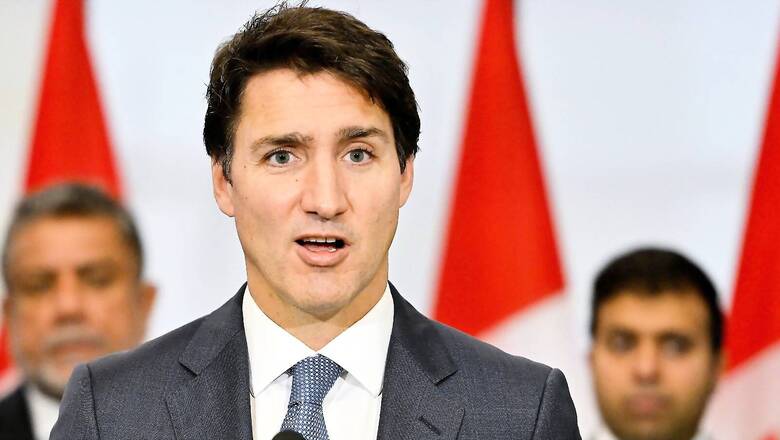
views
While a recently conducted opinion poll among thousands of Canadians shows a majority wish that the Canadian Prime Minister step down, a deeper look may be warranted at the darker side of Canadian politics. Often lauded for his looks and his performative support of equality and diversity, Justin Trudeau’s unpopular moves are quietly swept under a carpet of gushing news articles. He has had the misfortune of being the prime minister at a time of much global turbulence, and has unfortunately, rarely matched up to popular expectations.
Nations are forgiven for slow economic growth due to pandemic measures and Canada is still recovering. But as citizens struggle, the Canadian government has quelled all forms of protest by citizens, taking extreme counter-measures. At the same time, Trudeau has been at the forefront of supporting unlawful agitations in democracies. Caste protests attempting to speak for a minority of farmers in India saw a rapid spread of the virus, the livelihood of citizens in the region being affected for months, murders and gang rapes, and all this was funded by foreign sources. It saw Trudeau publicly support the protests that held a nation to ransom, with rhetoric chosen to distort the effect of a law designed to give greater freedom to individual farmers, while reining in the power of the middleman.
On the other hand, Canadians protesting the effects of some of the harshest vaccine and lockdown mandates in the world were dealt with an iron fist. Ironically, the Freedom Convoy highlighted the utter lack of freedom to protest, with those not even part of the protest but supporting it seeing their bank accounts frozen at a time of extreme financial insecurity. A total of almost C$8 million were frozen by Canadian banks while articles about how the freeze was more benign than experienced swarmed internet search pages. Despite his actions during protests, Trudeau also supported anti-government protests in China as the country struggled to rein in another wave of Covid-19 spread through strict lockdowns.
While his speeches mention democracy as an ideal, he has been public about being enamoured by Chinese authoritarianism and how they “get things done.” While increased military belligerence by China causes countries to reevaluate dependencies on the Communist authoritarian regime, Canada is at the forefront of “mending” ties. The Chinese government mouthpiece Global Times recently reported towards the end of 2022 that “China has become Canada’s second-largest trading partner and second-largest export destination. In the first eight months of 2022, bilateral trade reached nearly $61 billion, up 18 percent year-on-year.” This is despite Canada’s Industry Minister Francois-Philippe Champagne calling for a decoupling from China and more investment from the US. This is also at a time when more Canadians are hoping that their country can step away from dependence on China.
At the same time, in a recent G20 episode, Chinese premier Xi Jinping publicly dressed down the Canadian PM and in a humiliating exchange, accused Trudeau of leaking their discussions to the media. Canadian foreign policy has continued to remain fractured, with the recently concluded trilateral meeting with the US and Mexico. The North American neighbours discussed semiconductors, climate change and immigration among other subjects, and concluded with what suggests agreement to maintain the status quo for the issues discussed. At the same time, Trudeau seems to draw the ire of Asian powers, the European Union, as Canadian measures reduce the scope of trade between the two entities, while also fumbling when it comes to US investments and trade support. The EU has also seen its leaders call out the Canadian PM on his handling of the Freedom Convoy which had gained massive popularity and organic growth.
In a darker episode, his government has broadened the scope for euthanasia under new laws, enabling those with mental health issues to seek to die. The benign-sounding acronym for euthanasia called MAiD, short for medical assistance in dying, is being suggested to some of the most vulnerable people, especially senior citizens and the poor. As the rest of the world strides towards longevity, Canadian websites have been advising and advertising dying, and experts cite stories of people with no terminal issues essentially being “put to death”. Those who are poor or fear poverty are seeking death to escape poverty. In a horrifying dystopian turn of events, dying is making money for Canada. For a country that has nationalised healthcare, MAiD is saving millions for the government, while also targeting populations unlikely to contribute directly to national monetary gains.
Canada is no stranger to the medical industry’s motives superseding its people’s will; it imposed one of the strictest vaccine lockdowns as citizens lost jobs for being unvaccinated due to fears of ineffective and potentially harmful vaccines. As Pfizer’s vaccines are finally being questioned by the US authorities, the Canadian government remains unapologetic about its enforcement. At the same time, Canadian hospitals had remained heavily strained in trying to contain the spread of the virus while lockdowns were essentially an ineffective means of containment. While other democracies pursued caution but advocated opening the economy early on after the delta variant had passed, Canada saw the lockdown affecting children’s development due to continued school closures, as well as a tougher road to economic recovery.
Signalling a virtuous ideal is a necessary part of politics. However, it is insufficient for effective and beneficial policy-making, especially if actions undertaken are directly antagonistic to the ideal. Justin Trudeau may see his light dim. The son of Pierre Trudeau, one of Canada’s most popular prime ministers is seeing his popularity fading with a majority disapproving of his leadership. In light of continued negligence towards internal-led Canadian growth, increased dependence on China and idealisation of authoritarianism, his camera appearances may cease to make up for the shortfall. However, for as long as he leads, Trudeau bears the hopes of a struggling population, sometimes caught between poverty and death, as a different half determinedly looks away.
Sagorika Sinha is a columnist and podcaster with Masters in Biotechnology from the University of Bath. Views expressed are personal.
Read all the Latest Opinions here
















Comments
0 comment